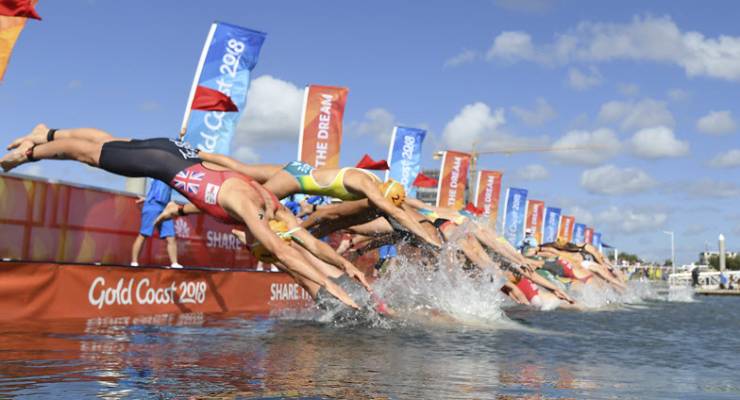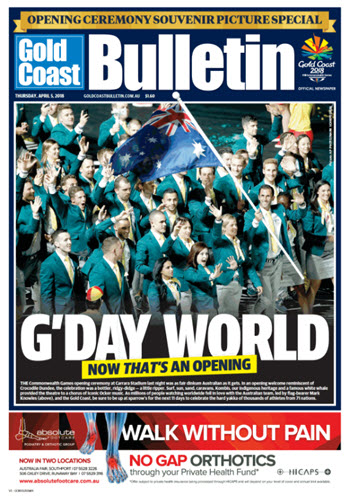
You might have heard that the country’s two biggest news outlets are boycotting the Commonwealth Games. But looking at the Fairfax and News Corp newspapers and websites today, there’s plenty of coverage of the Gold Coast event.
The Gold Coast Bulletin‘s eight-page picture wrap-around covering last night’s opening ceremony in today’s paper is almost entirely wire service images from Getty, and social photos taken outside the stadium.

And Brisbane’s Courier-Mail also dedicated its front page, and the following 12 pages, to the Games.
So what does the boycott actually mean?
Are the papers covering the Games, or not?
They are, but not in the usual way for a major sporting event. News Corp and Fairfax, who control all the capital city newspapers, their websites and the vast majority of regional newspapers, have boycotted the media accreditation process. That includes the Gold Coast Bulletin: a News Corp paper, which is carrying the badge of “official newspaper” of the Commonwealth Games. Accreditation gives those with the correct pass access to the events, the athletes’ village, and press conferences. And if journalists don’t have that accreditation, they’ll be either watching with the rest of the spectators or on the TV to cover the Games.
So how are they going to do it?
In a statement, News Corp’s Australasian executive chairman Michael Miller said his publications would have more than 40 journalists, photographers and “digital experts” covering the Games, having bought tickets for staff to sit in the stands with the crowds, rather than in reserved media seating.
Fairfax would not detail for Crikey how it plans to cover the Games, but in an editor’s note in The Sydney Morning Herald yesterday, Lisa Davies said their reporters on the Gold Coast would “still be bringing readers the big stories, as they happen, with the independence readers expect from Fairfax Media mastheads”.

For coverage of last night’s event, the extensive coverage in the News Corp Queensland papers relied on wire services they subscribe to, including AAP and Getty.
What is the dispute over?
Seven bought the rights to the Games for $40 million, which included broadcast, online and social media rights. News access rules are put in place by the governing bodies to protect the commercial value of those rights. But News Corp and Fairfax have been arguing for months that those rules are far too restrictive, including limits on content they produce, restrictions on where and how they can interview athletes, waiting 30 minutes after press conferences before broadcasting, and limits on digital news bulletins, among other rules.
“GOLDOC accreditation would prevent us from reporting the Games in the way that a modern audience accessing our content across platforms expects,” Miller said. “We are not signing up to antiquated and restrictive rules that are designed to prevent us covering the Games in the way our audiences expect. These rules would restrict us from using video for news reporting in the way Australian law allows us. It also restricts our ability to tell the stories of the Games in innovative ways that are expected of any news organisation.”
Are the restrictions usual?
They’re similar to what we have come to expect of the Olympics, which, in the past, have included news outlets recreating events with Lego as part of their coverage without the vision to support it. And Commonwealth Games officials say they draw on previous Games rules, “updated, as appropriate, to reflect the changing media landscape”.
Newspapers that are trying to produce video and social media content are now in competition with Seven, the rights holder, with their online content, and the rules have been updated to reflect that. Fairfax today is running an op-ed from lawyer and Age columnist Duncan Fine arguing that the bureaucracy around the Commonwealth Games, including what he calls the pettiness of the rights business, has ruined them.
News Corp also made similar comments about restrictions on the South Korea Winter Olympics.
Will it make any difference?
News Corp and Fairfax both, predictably, say their coverage will be better for the boycott. They’re arguing their independence will allow them to bring better stories to their audiences. You won’t see photos from News Corp or Fairfax photographers shot from the reserved media areas, but they do have subscriptions to the wire services who do have access, for photos and stories. The press conferences and events will be covered, either from wire copy or by the outlets’ own journalists watching them on TV. And the major media conferences will be held in a media centre they do have access to.








There’s something incredibly récherché about the Commonwealth Games. For some reason I expect the male swimmers to be wearing one piece neck-almost to the knees-bathing suits. And the games are banal to the point of idiocy. Whether it’s because QLD is holding them, or because the competitors know they’re only there by default-because they weren’t good enough to try for the Olympics.
Well I certainly won’t be watching amateurisville.
Nice little unnecessary kick in the crotch for Queensland. Well done! Hope that it makes you feel a tad smug, you twirp.
Look again. Many of the athletes competing are also Olympians (ok, so netball and bowls aren’t Olympic sports). As for your snarky comment “amateursville”, it’s all about participation and trying you best, not trying to make as much money as you can along the way. Have you notice how noticed what great role models our professional (definitetly not amateurs) men’s cricket team has been lately
If our cricket team are not amateurs, why do they behave like amateurs?
I have been told there has been an exodus of about a quarter of the Gold Coast population to take holidays-elsewhere to get away. The Commonwealth is mainly made of the type countries that President Donald Trump has already described graphically- so there won’t be any financial benefit of the Gold Coast – hotels which usually have 90% occupancy are around 60%. and to top it off the team managers are officially called ‘chef de mission’ – the dumb organisers haven’t realised Commonwealth Games refers to the British Commonwealth all of whom actually speak English as their language. So far I haven’t seen in the history books that French was even the second language of the old British Empire.
As with the cricket & footie, the baleful effect commercialism has on sport surely reached peak stupid when the sponsors refuse to allow the wrong sort of fast food, enforced with security screening, to intrude into the sacred venues.
Similarly with reportage, images are copyright and there seems to be an attempt to do with the same with words.
What next, journos. ’embedded’? Coz that worked a treat for truth or even verisimilitude in Iraq.
Boycott is spin talk for “we lost the bid” then?